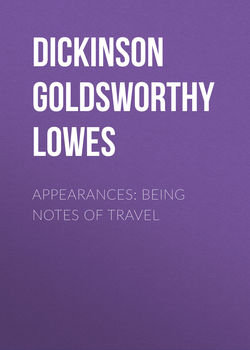Читать книгу Appearances: Being Notes of Travel - Dickinson Goldsworthy Lowes - Страница 4
PART I
INDIA
III
ULSTER IN INDIA
Оглавление"Are you a Home Ruler?" "Yes. Are you?" Instantly a torrent of protest. He was a Mahometan, eminent in law and politics; clever, fluent, forensic, with a passion for hearing himself talk, and addressing one always as if one were a public meeting. He approached his face close to mine, gradually backing me into the wall. And I realised the full meaning of Carlyle's dictum "to be a mere passive bucket to be pumped into can be agreeable to no human being."
It was not, naturally, the Irish question for its own sake that interested him. But he took it as a type of the Indian question. Here, too, he maintained, there is an Ulster, the Mahometan community. Here, too, there are Nationalists, the Hindus. Here, too, a "loyal" minority, protected by a beneficent and impartial Imperial Government. Here, too, a majority of "rebels" bent on throwing off that Government in order that they may oppress the minority. Here, too, an ideal of independence hypocritically masked under the phrase "self-government." "It is a law of political science that where there are two minorities they should stand together against the majority. The Hindus want to get rid of you, as they want to get rid of us. And for that reason alone, if there were not a thousand others" – there were, he hinted, but, rhetorically, he "passed them over in silence" – "for that reason alone I am loyal to the British raj." It had never occurred to me to doubt it. But I questioned, when I got a moment's breathing space, whether really the Hindu community deliberately nourished this dark conspiracy. He had no doubt, so far as the leaders were concerned; and he mistrusted the "moderates" more than the extremists, because they were cleverer. He "multiplied examples" – it was his phrase. The movement for primary education, for example. It had nothing to do with education. It was a plot to teach the masses Hindi, in order that they might be swept into the anti-British, anti-Mahometan current. As to minor matters, no Hindu had ever voted for a Mahometan, no Hindu barrister ever sent a client to a Mahometan colleague. Whereas in all these matters, one was led to infer, Mahometans were conciliation and tolerance itself. I knew that the speaker himself had secured the election of Mahometans to all the seats in the Council. But I refrained from referring to the matter. Then there was caste. A Hindu will not eat with a Mahometan, and this was taken as a personal insult. I suggested that the English were equally boycotted; but that we regarded the boycott as a religious obligation, not as a social stigma. But, like the Irish Ulstermen, he was not there to listen to argument. He rolled on like a river. None of us could escape. He detected the first signs of straying, and beckoned us back to the flock. "Mr. Audubon, this is important." "Mr. Coryat, you must listen to this." Coryat, at last, grew restive, and remarked rather tartly that no doubt there was friction between the two communities, but that the worst way to deal with it was by recrimination. He agreed; with tears in his eyes he agreed. There was nothing he had not done, no advance he had not made, to endeavour to bridge the gulf. All in vain! Never were such obstinate fellows as these Hindus. And he proceeded once more to "multiply examples." As we said "Good-bye" in the small hours of the morning he pressed into our hands copies of his speeches and addresses. And we left him perorating on the steps of the hotel.
A painfully acquired mistrust of generalisation prevents me from saying that this is the Mahometan point of view. Indeed, I have reason to know that it is not. But it is a Mahometan point of view in one province. And it was endorsed, more soberly, by less rhetorical members of the community. Some twenty-five years ago, they say, Mahometans woke to the fact that they were dropping behind in the race for influence and power. They started a campaign of education and organisation. At every point they found themselves thwarted; and always, behind the obstacle, lurked a Hindu. Lord Morley's reform of the Councils, intended to unite all sections, had had the opposite effect. Nothing but the separate electorates had saved Mahometans from political extinction. And precisely because they desired that extinction Hindus desired mixed electorates. The elections to the Councils have exasperated the antagonism between the two communities. And an enemy might accuse the Government of being actuated, in that reform, by the Machiavellian maxim "Divide et impera."
What the Hindus have to say to all this I have not had an opportunity of learning. But they too, I conceive, can "multiply examples" for their side. To a philosophic observer two reflections suggest themselves. One, that representative government can only work when there is real give and take between the contending parties. The other, that to most men, and most nations, religion means nothing more than antagonism to some other religion. Witness Ulster in Ireland; and witness, equally, Ulster in India.
